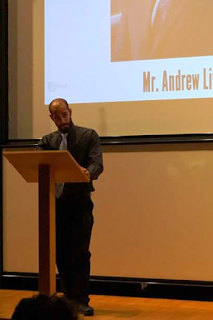Tuesday, 24 February 2015
William De Oliveira - Experiences from 'Bhopal'
Jon Heggestad - Experiences from 'Bhopal'
When I met Sudhir Selvaraj in the fall of 2013, we were both studying in London and were surprised to discover several mutual connections relating to Minnesota- the state where I had been born and raised and where he had done his undergraduate studies. It was only a month or two later that Sudhir told me about his play, We All Live in Bhopal, and asked if I would be willing to participate in a reading of it.
At our first read-through the script, I joked that I had been typecast for my role as the American, Michael Parker. This was funny today to me at the time, and I made a few remarks about wanting to play the part of someone else, like Champadevi Shukla. Through being involved in the production, however, I realized how little I actually knew about the Bhopal incident, becoming uncomfortably aware of the rather ugly irony in my playing the part of this American.
To some degree, I think that it's impossible to escape the stereotype that as an American, ethnocentrism will attribute to one of my many flaws. My country is large and riddled with problems, and it's often hard to see whats happening outside of our borders, even when it's so intrinsically tied to us. I'm not writing this down as an excuse or in hopes of being pardoned for my ignorance, but only as a means to highlight the importance of projects like the one Sudhir has chosen to tackle. This sort of education is exactly the answer to the apparent indifference shown by so many like me. Through this creative production, he's aimed and achieved a literal stage by which he has captured a moment in history that ought not to be forgotten, even when (especially when) large players are actively trying to "move on" from it. More than remembering, he has actively informed many like me, and succeeded in igniting an appeal to justice and human rights. For that, I'm not only thankful for this production, but for being able to work with Sudhir - a man who is aware of his gifts and of how he can best use them.
My experience taking part in We All Live in Bhopal was informative on so many levels, and hearing the updates from Sudhir as he continues to produce his play around the globe is truly inspiring.






